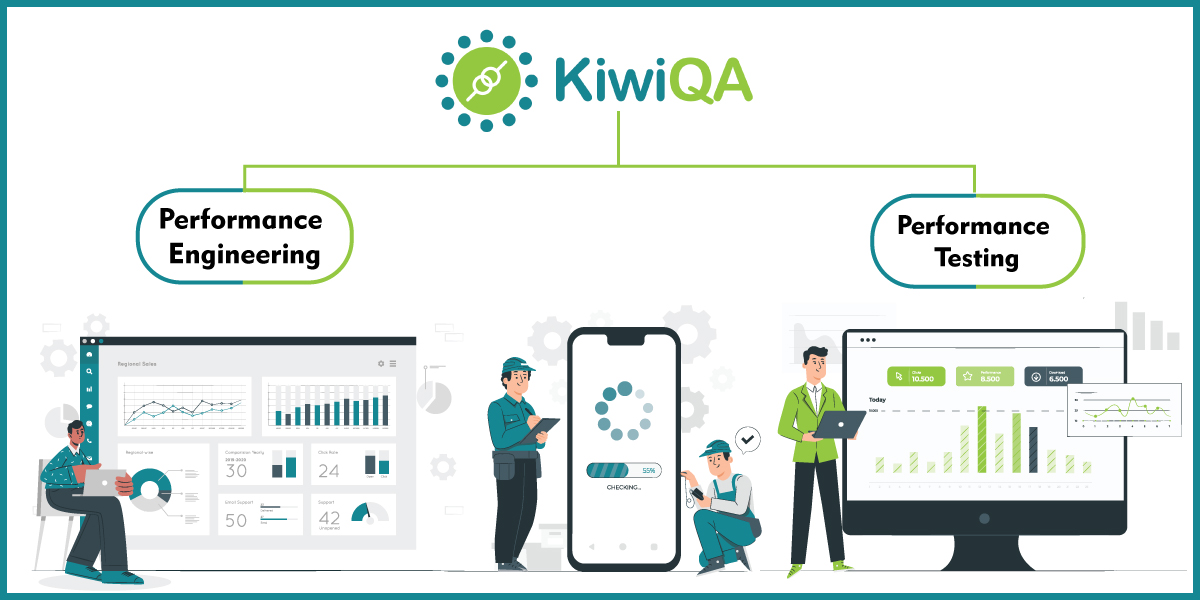Key Differences Between Performance Engineering and Performance Testing

 KiwiQA
KiwiQAAn appealing website (or web application) goes well beyond its user experience or superlative design. Though intuitive UI/UX is one of the essential fundamentals of today’s websites or apps, its performance also matters a lot. Take a hypothetical scenario – your team has delivered a well-designed app but testing has not been performed for checking its performance under different kinds of load(s).
It is likely that you would gain an initial set of users but the app might fail to perform once a large number of users are simultaneously using the app. A high-performing app adds a lot to the user conversion, growth, and overall revenue of the organization. A software testing company can support enterprises with performance testing in case they do not have an in-house team to perform these important test activities.
Performance testing is primarily used by companies to ensure that the performance and reliability of the app and its associated web services are optimal under different load types. However, many professionals use performance engineering and performance testing interchangeably though there is a significant difference between both of them.
In this blog, we look at the essentials of performance testing and performance engineering along with deep-diving into these practices.
Performance testing of web applications (or websites) is done by simulating the load on the application under test. The load could be the number of users currently using the application, thereby loading the application to a peak load.
The intent of performance testing is to check the website or application from a scalability, reliability, and responsiveness point of view. It is performed to ensure that the application maintains its top-notch performance under high load conditions. The removal of performance bottlenecks goes a long way in ensuring that the application’s performance remains top-notch irrespective of the load on the application.
The result is improved user experience – a factor that goes a long way in retaining users to the website (or application). There are different types of performance tests; the major ones are listed below:
In case you want to get started with performance testing, do check out our comprehensive guide to software performance testing.
Choosing the right performance testing tool is important to make the most out of that testing strategy. LoadRunner and JMeter are the most popular performance testing tools. The comparison between JMeter vs. LoadRunner would help in choosing the performance testing tool that suits the project needs.
Performance testing is normally done by QA engineers that are proficient with this testing approach.
In many scenarios, it is best to partner with a company like KiwiQA that has a global presence and has extensive experience in providing performance testing services to a range of businesses.
Also Read – Key Performance Metrics for Effective Performance Testing
Now that we have covered the important aspects of performance testing, it’s time to deep dive into performance engineering. Contrast to performance testing, performance engineering is a discipline to ensure that best practices are applied in the product development process (irrespective of whether you are using the Agile or SDLC approach).
Major enterprises use the Agile approach to software development instead of the SDLC approach. You can check out best practices of Agile test automation to make the most out of this software development methodology. In performance engineering, emphasis is laid on the overall usability of the product (i.e. scalable architecture, top-notch security, modularized code structure, improved UI/UX design, etc.).
A performance engineer (not a performance test engineer) inculcates the best industry standards in the system to build a high-quality software product. Performance engineers verify the performance of the website (or app) at critical junctures of product development.
Contrast to performance test engineers who have working experience with a range of performance testing tools; performance engineers have in-depth knowledge and experience in designing scalable software architecture, code profiling, database optimization, performance forecasting, and more.
Though performance engineering and performance testing might sound similar, there is a thin line of difference between them. Performance test engineers and performance engineers use the best-suited performance testing tool for verifying features of the application under different load conditions. However, the difference lies in the manner in which they design and analyze the respective tasks.
When testing the web application (or website), a performance test engineer would look at the time taken to complete a particular request. In case there are performance issues, the engineers assign the issue to the development team.
On the other hand, a performance engineer has the potential to analyze the reason behind the performance lag. Since the engineer(s) have in-depth knowledge about scalable web architecture, they try to find the solution and help the development team incorporate the solution. The result is a performance-optimized web application that results in customer delight.
A performance testing company could help businesses in building and execution of a fool-proof performance testing strategy.
Here are the in-depth differences between performance testing and performance engineering:
Performance testing involves testing the application (or website) by mimicking different loads on the system. This is to ensure that the application performs well under different load conditions. On the other hand, performance engineering involves the usage of best practices related to SDLC (or Agile) to build a high-performing scalable and secure web application.
In performance testing, QA engineers (with proficiency in running performance test tools) unearth performance issues in the system and assign them to the respective developers for fixing the same. On the other hand, performance engineering is more about using the best software development practices for building scalable, secure, and reliable software system that meets the overall business requirements.
There is extensive usage of performance testing tools (e.g. LoadRunner, JMeter, etc.) when running performance tests. On the other hand, performance engineering is like a discipline that comprises best practices for building a high-performance software product that exceeds the customer’s expectations.
Performance testing can be performed using cloud-based tools whereas performance engineering requires in-depth knowledge about programming skills and project methodologies (like Agile, SDLC, etc.)
Performance testing and performance engineering are both important from a product quality point of view. To make the most out of them, it is essential to leverage the best practices of both the approaches.
Many enterprises partner with a reliable & experienced performance testing services company whilst relying on the in-house team for building a culture that focuses on performance engineering.
This approach in turn helps in rolling out high-quality software products (websites or applications) that drive stickiness and customer delight!
Subscribe to our newsletter for some hand-picked insights and trends! Join our community and be the first to know about what's exciting in software testing.
Welcome to the testing tales that explore the depths of software quality assurance. Find valuable insights, industry trends, and best practices for professionals and enthusiasts.

Fill out and submit the form below, we will get back to you with a plan.
 CRN:
22318-Q15-001
CRN:
22318-Q15-001 CRN:22318-ISN-001
CRN:22318-ISN-001 CRN:22318-IST-001
CRN:22318-IST-001